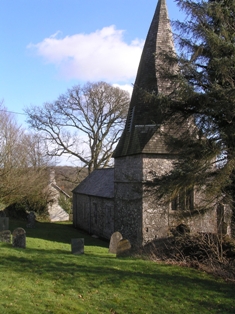Since before the Reformation bell ringers operated more or less independently of the church. It is recorded that many bell ringers spent much of their time in the ale house, and even drank and gambled in bell towers. They often rang when they felt like it, with scant regard for the church.
This led to increasing tension between clergy and ringers, and a couple of decades later, the reforming clerics turned their attention to ringers.
The Belfry Movement
In the mid-19th century Rev. HT Ellacombe, an engineer turned priest, who was Rector of Clyst St George in Devon, started to improve things in his own Parish. Then with others, notably Cannon Woolmore Wigram, he stirred up other clerics to do likewise. This became known as the ‘Belfry Reform’ aimed to bring ringers more closely into the life of the church, and to improve their conduct. One effect of this was to revive interest in change ringing, and another was the formation of ringing societies so that ringers in different towers could help and support each other.
The Story of West Worlington Bell-ringers
|
It appears in West Worlington that such a problem of unruly bell-ringers existed and the Rector of the Parish the Rev. C. W. Molony (1880 and 1885) decided to do something to address the problem, only to find himself and his family in conflict with the bell-ringers. The story unfolds in an article in The Bell News and Ringers’ Record: A Journal of the Ringing Exercise and Compendium of Information for The Clergy & Churchwardens No.13 V.1 February, 1882. The article reads: The Rev. C. W. Molony, the Rector of West Worlington, North Devon, has written a long letter to the Church Times, wherein he alleges the following: |
 |
Sir, — We are exposed to the greatest outrages on the part of the bell-ringers here, aided by associates from the neighbouring parish. All this is owing to my having endeavored to put a stop to the bell-ringing during what is called the Revel week, which occurs yearly in the early part of August. My reason for so doing was that during that week there is such a great amount of drunkenness, even on the part of some of those ringing the church bells. The belfry key, however, was taken from the door, and a strong barricade, which I had placed inside against the door in consequence, was broken through and the bells were set pealing. I then got a new lock put to the door, and have since kept the key myself. I then drew up a set of plain and easy rules, which however, they refused to sign, and they insisted on having the key in their power, and ringing whenever they liked. They threatened to do something dreadful.
The first thing they did was to come at night and steal a number of chickens, the wire fencing, and a number of posts, wringing off the heads of some of the chickens on their way back. Since then my wife and a daughter have had large stones thrown at them from the public houses, one of which came quite close to their heads, and from that time we have been yelled at very often when we have been out by one or other of these men or their associates. We were alarmed on Monday with a cry of fire, and on rushing out found in 100 feet of building, consisting of coach-house, two-stables, and a large cow-house in sheets of flame. With the greatest labour and difficulty we got out everything except one fine cow, which was already burnt to death in the stall, which blazed like a furnaces. The yard was soon filled with villagers and others, and by incessant hard work, and through God’s great mercy, the flames were kept from the house. The outbuildings being thatched caused the fire to spread most rapidly. Since that awful night the police have been trying to trace the deed home to the perpetrators of it. Although a constable is sent here every night from a large village three miles off, to be on guard till the following morning, yet until the criminals are arrested our lives are not safe, as they still threaten the most horrible things, and declare this is only the beginning.”
The above accusations are certainly startling. Belfry reform, which within the past few years has taken a firm hold in many places in Devon, has not, it would seem, yet arrived at West Worlington. Such behaviour as the above letter sets forth the members of no well-organised society, either of half-pull or call-change-ringers, would be guilty of. Our experience of every conceivable kind of ringer is that whatever may be the wishes of the rector or vicar they acquiesce in his decisions in connection with the bells, at any rate without physical opposition. On perusing the above, we were prepared to hear that it was not the end of the matter, as the following extract from the North Devon Herald shows:
On Saturday, before Viscount Ebrington (chairman), and four other justices, at the Town Hall, South Molton, the Rev. Charles Walker Molony, rector of West Worlington, applied to have John Leach, of East Worlington, bound over to keep the peace towards him and his family in consequence of threats used towards him by Leach at the Angel Inn, Witheridge, on the 14th November.— James Baker, landlord of the Angel Inn, deposed that Leach said in his house on the day named, ‘They weren’t going to be governed by a Paddy. They would get rid of him; they were bound to get rid of him, and the best place for him was back in Ireland, or else the church and tower would fall.’ Witness understood defendant to mean Mr. Molony. – Mr. Chas. Manning (South Molton), stated that he was in the house of Mr. Baker at the time the defendant was there, and heard defendant say , ‘We’ve hanged him and burned him, and he’ll be served worse if he don’t go back to Ireland . If he don’t go back he’ll be murdered yet, and the church and tower will fall.’ Witness was told by Mr. Baker that defendant referred to Mr. Molony, the rector of West Worlington. The words were not uttered in anger, and witness treated them as a joke. – Mr. Molony stated that on the night spoken of his stables and coach-house were burnt and destroyed; also his sheep-pen and a cow. The fire was the work of an incendiary, and he was then afraid that defendant, in consequence of his threats, would do him or his family some bodily injury. Mrs. Molony also said she was passing the Inn at West Worlington with her daughter, and believed the defendant was the man who threw two stones at them. She could not positively swear to the man, but had no doubt in her mind that it was he. – Superintendent Wood said he believed Mr. Molony required protection. Defendant denied that he ever threatened Mr. Molony, and said he always treated the rector with respect when he met him, and that he was not the person who threw the stones at Mrs. Molony and her daughter, and never had anything to do with the fire as alleged.
After considering the case the Bench required the defendant to enter into reconnaissances, himself in £20 and two sureties in, £10 each, to keep the peace for six months towards Mr. Molony and his family, and to pay the expenses, amounting to £2.3s.
The Rev. Walter Meddon Bruton, rector of East Worlington, and his servant, Samuel Tucker, became sureties for the defendant”
 |
The magistrates appear to have adopted the most sensible course; but it certainly is a puzzle to find the rector of an adjoining parish becoming the defendant’s security. It is to be feared there are other and not less painful circumstances connected with this case which have not transpired; the fact that nothing was shown before the magistrates of the defendant’s connection with ringing creates a suspicion that under the influence of terror, and from former disagreement with the parochial ringers, the rector may have imagined ringers his natural enemies, and thus lay everything to their door. Such conduct as the above, however, from whatever quarter it may come, is highly reprehensible. |
Source:
THE BELL NEWS AND RINGERS’ RECORD:
A JOURNAL OF THE RINGING EXERCISE; AND COMPENDIUM OF
INFORMATION FOR THE CLERGY & CHURCHWARDENS No.13 V.1 FEBRUARY, 1882.





